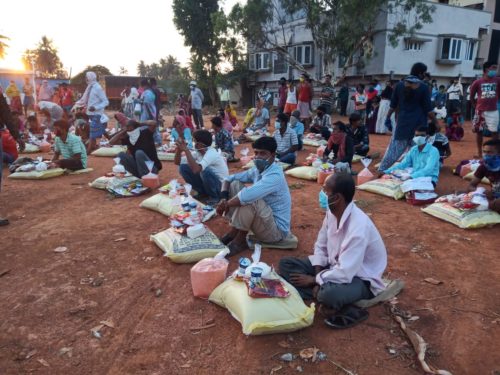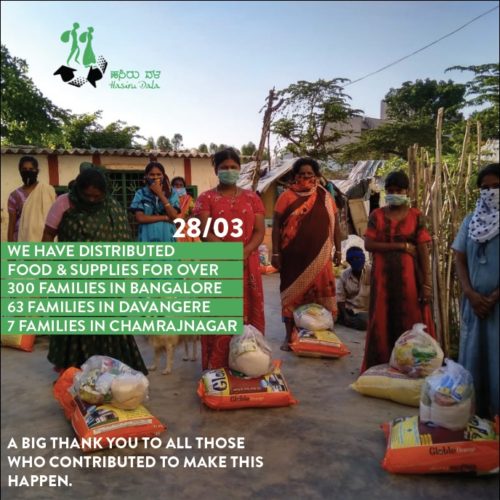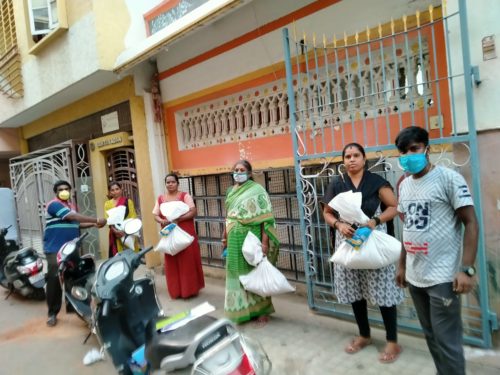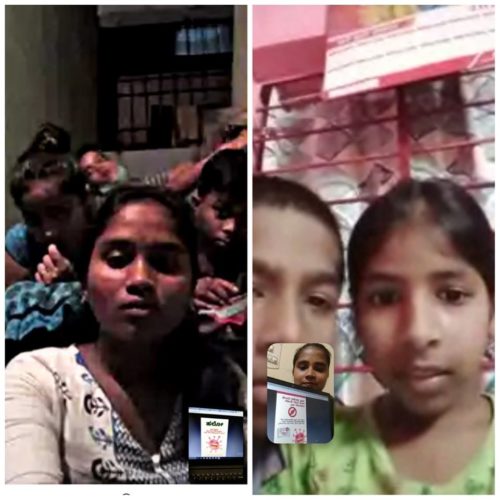Posted by Alliance of Indian Wastepickers
Written by Junaid ul Shafi
Region Asia-Pacific
Country India
May 21, 2020
Introduction
The COVID 19 Pandemic has forced governments across the globe to shut down their residents into lockdown. In India, the lockdown was announced on the evening of 21st march which led to a humanitarian crisis in several parts of the country. Millions of workers, students are stuck in faraway cities outside their homes and are unable to reach their places of origin due to strict restrictions on the movement of people. Millions of people have lost their livelihood and thousands are on the verge of starvation. The marginalised sections and the poor are fighting both COVID 19 and starvation.
Unlike the rest of India, the state of Karnataka went on staggered lockdown before the announcement of nation-wide lockdown by the central government. Millions of people experienced difficulties in work or decrease in their incomes. Bangalore is the largest city of Karnataka experienced lockdown measures for restricting the spread of COVID-19 in the early march. By 13th of March educational institutions were closed and malls and other public places were declared a no-go area. The lockdown impacted every section of society. It is taking a serious toll on the vulnerable sections of informal workers including the daily wagers.
Background
There are millions of waste pickers and informal waste collectors in India, who pick up, clean, sort grade and trade. They sell the material further up the value chain to the local scrap dealers to make a living. This is their only source of livelihood. Their nature of work has put them under serious threats. They are at risk from handling unmarked domestic biomedical waste emerging from homes where COVID-19 patients are quarantined. It has been found that plastic objects are a means of transmission of SARS-COV2 virus; people who pick the solid waste often unsegregated are at severe risk. In Pune, face masks dumped by users in household garbage were being collected by waste pickers, A report[ref]Indian Express dated 23rd of March 2020, also see https://indianexpress.com/article/cities/pune/coronavirus-no-system-in-place-for-disposal-of-used-face-masks-6327063/[/ref] published in Indian Express stated that there was no mechanism for collection and disposal of masks and domestic biomedical waste generated by more than 2,000 people under home-quarantine across the district for having a travel history or showing COVID-19 symptoms. It has also been reported that informal workers are not allowed to work and collect waste or segregate garbage which has led to open dumping, Police is not allowing waste pickers and other informal workers to venture out of their homes or travel between localities due to lockdown[ref]Workers blocked, the threat of open dumping looms large, Pune Mirror dated 16th of April 2020 also see https://punemirror.indiatimes.com/pune/civic/workers-blocked-threat-of-open-dumping-looms-large/articleshow/75112620.cms?utm_source=contentofinterest&utm_medium=text&utm_campaign=cppsts[/ref].There are thousands of Waste pickers (WP) and informal waste collectors (IWC) in Karnataka, most of those are based in the city of Bangalore. In Bangalore, the number of waste pickers ranges from 15000 to 35000, who work hard to earn their livelihoods. Hasiru Dala is a social impact organisation with a focus on securing justice for waste pickers and informal waste collectors had to intervene for ensuring the survival of WP families. The organisation has been working with WPs and IWCs in Bangalore since 2011. In the past, according to the experience of Hasiru Dala during events like demonetisation[ref]When 84% of all currency in India was demonetised in November 2016[/ref] and recession in the plastic industry[ref]Primarily due to the shock of implementation of GST[/ref] lead to depletion in income for WPs and IWCs had directly and quickly resulted in malnourishment among children and women, that forced the organisation to quickly respond to this crisis.
Identification and Assessment

The relief distribution
When the lockdown to restrict the spread of COVID 19 was announced in Bangalore, thousands of WP families were on the verge of starvation due to loss of their regular source of income. The urgent task was to provide these families with some immediate relief. Identifying the families and assessing their special needs was not an easy task. The organisation made special arrangements for different communities keeping in mind the food consumption patterns of the target groups. One community preferred steam rice and pigeon pea (tur dal) while another group of people preferred red lentil locally known as Masur dal. The organisation believed that during a phase where starvation like situation, changing diet would result in a health crisis so extensive care was taken to provide appropriate staples for the families. Hasiru Dala had to ensure that the appropriate food packets are delivered to the right group. She informed that there is a shortage of grains and other essentials in the wholesale market due to restrictions on transport and absence of labour, they were trying their best to procure the food and other essential materials for the beneficial families. Distribution of relief material was not easy. The distribution was carried out in phases. In the initial stage, the most vulnerable section of about 500 families was provided with emergency relief materials. The selected families were mostly those who lacked access to the public distribution system (PDS), public housing facilities or were single mothers among WPs. They were provided with food kits comprising of rice, lentils, spices, vegetable oil, soaps, tea powder and other essentials. The team members and volunteers ensured that physical distance is being maintained by the beneficiaries.
In the second stage, people with access to PDS, but who do not get anything other than rice from PDS were selected. They were provided with food kits comprising lentils, soap, sugar, spices, chilli powder and vegetable oil.
In the third stage, WithBengaluru, a citizen lead initiative that provided cooked food approached Hasiru Dala if the organisation could extend the ration kits to workers from different sectors and other vulnerable communities like interstate migrant workers, garment workers, domestic workers, construction workers, sex workers, trans persons. The organisation rapidly plunged into action to make a difference in the lives of these communities with limited resources in hand. They were provided with dry food kits which contained food grains and other basic materials for about a month for a family of four.
In the 4th stage, the organisation is currently engaged in providing hygiene kits, protein kits and other special kits for children. These kits are being provided to young children, lactating mothers, and pregnant women. The hygiene kit has been specially devised keeping in view the needs of target groups. The hygiene kit includes toothpaste, toothbrush, appropriate size reusable face masks, a towel and two different kinds of soaps. The special children hygiene kit contains protein-rich grains and a leaflet containing basic information about COVID 19 in Kannada.
In the fifth stage, WPs and their family members who were on prescribed medicines for diabetes, cardiac conditions, mental health conditions and blood pressure are being supported with medicines lasting for about a month.
There were two reports in local newspapers, one about an incident in Nelamangala and another near Chikkaballapur where the report highlighted the struggles of waste pickers who had not received any sort of food support from anyone. The other article alluded to an old couple whose collected recyclable materials were burnt down by unknown persons. Hasiru Dala was quick to respond and supported waste picker families in both the regions.
Two large areas of waste pickers in the outskirts of Bangalore and one in an isolated area of Yelahanka zone were identified by citizens, in total 280 families who were supported with ration and grocery kits immediately
CHALLENGES
Highways closed, road barricaded and streets patrolled by cops ensuring the movement of volunteers and team members was a herculean task. With severe restrictions on movement, the challenge was to get permission for vehicle movement and individual passes for Hasiru Dala team members and volunteers. The task was way beyond organisations human resources to carry out the entire operation by itself, there was a need for a large number of volunteers. The organisation was given only 40 passes which proved highly insufficient keeping in mind the scale of operations.
One of the primary challenges was the procurement of food grains in this lockdown when markets were closed, and the transport was off the road. The other challenge was setting up distribution channels for relief. The special food kits were packed on the food habits of beneficiaries. The organisation had to ensure that the relevant kits are being distributed in specific areas and there is no duplication of distribution.
The community leaders ensured the distribution is transparent. The leaders used to give tokens and were highly active in the distribution of food kits in their localities. The workers were packing and distributing food kits with a view that they must ensure that these kits reach their own people and to everyone. The state and municipal governments have been supportive so far in the distribution of relief material. In one of the instances, during the distribution of kits in lockdown the workers had to take help of police personnel when their vehicle was surrounded by a desperate crowd.
The presence of cops ensured that physical distance is maintained, and the relief reaches to every person in the locality
Learning
The previous data which the organisation has collected of families and localities proved very helpful in this turbulent situation. The support of community members is crucial in the distribution of food kits, their support and trust ensure that it reaches everybody. The data of beneficiaries helped us to cross-check whether every deserving family has received the kit or not. The cell phone numbers of the families and community members were used to call to check if the packets reached the families or not. Such measures helped in maintaining transparency and accountability of those who were in distribution.
Dry Waste Collection Centres (DWCCs)[ref]Dry Waste Collection Centres (DWCCs) facilitate the streamlining of the entire process of waste management in the city, by concentrating exclusively on dry waste. They are equipped with an appropriate infrastructure capable of purchasing, collecting, aggregating and processing both high value and low-value dry waste such as plastics, paper, glass, tetra packs.[/ref]
Hasiru Dala not only works for the welfare and empowerment of people engaged in waste collection and sorting but has also been working to turn them into entrepreneurs. Due to lockdown, the DWCCs are running out of space to store sorted recyclable solid waste. The entrepreneurs are left with no money to pay workers, bear day to day operational costs and no additional space available to store sorted recyclables in the centres is adding to the existing challenges. The municipal authorities have not released the money due towards DWCCs, which has put the livelihood of those who run DWCCs and those who are associated with them under risk.
The organisation is providing relief to the people running DWCCs by providing grocery kits and other financial support so that they keep on functioning. In the initial week of lockdown, the organisation provided 15 DWCCs with diesel expenses for a week to ensure the collection does not stop and services are being rendered to the citizens. The DWCCs were provided with personal protective gear and sanitizers by the organisation. For a few days, DWCCs workers were also provided cooked food.
Currently, Dry waste collection centres are not functional at their best as recycling of waste is not considered an immediate economic activity or a part of essential services during the lockdown. The collection of waste from households is declared as a part of essential services and not recycling or waste processing. The WPs are out of work and godowns are full of dry waste. Even when the lockdown is lifted, there will be very little demand for scrap and other solid wastes due to the slowing of economic activity. The vehicles of DWCCs are still going out for the collection of dry waste twice a week. Even with no space or recycling option available, they are stocking the material.
Fundraising

Copy of the poster used for daily communication with the donors.
The pandemic impacted every section of society. It was not easy to raise the funds. With the help of our partners and other donors, Hasiru Dala was able to raise the money for this crisis. The organisation utilised social media platforms like Twitter, Facebook, Whatsapp and word of mouth to spread the information about the fundraising effort. The campaign seemed successful and we were able to raise 48% of funds by individual donors from the platforms like Ketto, the rest of the funds were given by other institutional partners and donors. The people donated with open hearts. In the first 48 hours of the campaign, the organisation was able to raise about a million (In Indian rupees). The organisation has raised so far INR 4.80 cr. Many people have donated directly to the account of the organisation while a good chunk of funds was raised from platforms like Ketto.
The success of the fund-raising can be laid down to three factors – the quick turnaround before and after the lockdown was initiated to call for support; simple and transparent messaging with frequent updates on the work being accomplished, and the spreading of the call for funds through established networks of supporters where trust was already established. The institutional help from other partner organisations has been significant.
WithBengaluru Initiative

Relief distribution with the help of WithBengaluru
The organisation plunged into action to support other vulnerable communities when requested by a citizen-based platform WithBengaluru. The organisation is working together with ‘WithBengaluru’, an initiative run by a collective of different social and nongovernmental groups to ensure that no one dies of hunger in this city of 13 million people. The initiative is providing cooked meals to thousands of persons and families belonging to marginalised and vulnerable sections particularly daily wage workers, interstate migrant labourers. The organisation is an important component of the WithBengaluru initiative to check that relief reaches to every person and there is no duplication of relief material or kits.
So far, Hasiru Dala has distributed relief material (one month ration) to 11,767 families in the city. The organisation has also provided 2,475 grocery kits to the vulnerable families of waste pickers in Tumkur, Mysuru and other cities and towns of Karnataka. With the help of WithBengaluru, Hasiru Dala was able to help in providing 24,201 families of all other informal workers with monthly ration kits
Future Challenge
The biggest challenge before the organisation is to revive the economic activity of WPs. There is a threat that WP families might end up in debt and their children can drop from the schools. The organisation is trying its best to help WPs to revive their livelihood as they cannot always stay on hand-outs. Efforts are also being made t0 identify places where solid waste can be stored during the lockdown as DWCCs and IWPs are running out of storage capacity.
Healthcare
The organisation is also aiding those who need immediate medical attention or those who are dependent on medicines. They are being provided financial assistance in procuring the medicines from designated stores. The organisation is also working to provide access to medical professionals and doctors on phone. The prescription on the phone is being taken as an emergency medical prescription and advice.
Education

Video calls with the children of waste-pickers
One of the significant impacts of the lockdown has been on the children of WPs and IWC. Efforts are also being made that none of their young children drop out of schools. The economic and other obstacles are one of the hurdles in their access to the online mode of education. The organisation had launched a platform for children of all ages and genders to access education, better reading skills, skill development and leadership skill development. Buguri Children’s Programme works with over 3500 children of waste pickers and informal waste workers through its libraries and education support programs. In the current crisis, efforts are being made to ensure that knowledge is being imparted to the children of WPs and IWCs.
Immediately after the lockdown was imposed the library educators across the three locations (Bangalore, Mysore and Tumkur) updated the contact numbers of the parents and also ascertained if their handsets had internet access and had access to Whatsapp, in the coming days Whatsapp groups, especially for children of WPs and IWCs, were formed. EBooks and reading material was shared for the children
The organisation is also giving incentives to the children of WPs and IWCs in the form of stationery and scholarships to ensure that they continue with studies with zeal and excellence.
A community radio programme with inputs of children in the lockdown is being broadcasted. The coordinators of the Buguri are reaching to children every working day to learn about their day to day activities and how they and their parents are dealing with the lockdown. Listening to their ideas through phone and community radio has become an important tool to counsel and support children in these times.
The access to smartphones is limited and wherever there is access to the internet or Whatsapp, it is via the smartphones of parents. The educators must keep in mind the availability of children and their parents to impart education through digital media. Due to lockdown and lack of financial sources, several parents are unable to pay the bills of their smartphones which restrains the ability of their kids to access the web-based education.
Post-Lockdown Strategy
The recycling industry across the globe is either shut or working minimal during this pandemic. Supply chains have been broken and the restrictions on transportation have complicated it further.
The current lockdown has again shown the vulnerability of the plastic waste industry. The crash in global crude prices has added the complications. After the easing of lockdown, there might be some economic activity pertaining to recycling of dry waste but there is going to be a very low demand due to fall in global crude prices and slowing of the economy.
There is a need to make long-term initiatives which will sustain the waste pickers and DWCCs in case of market shocks or other crises like a pandemic, the economic recession in future. There is an urgent need to preserve the physical and mental wellbeing of WPs and IWCs. All the WPs and IWPs must be linked to financial institutions like banks so that they can avail government assistance in the form of cash irrespective of howsoever meagre the amount is. Efforts are to be made to support the DWCCs and other workers with finances with very low-interest rates so that they are able to generate a viable economic activity and become independent within a reasonable time. Incentives like an Emergency fund or prolonged food support can also be provided for the same.
Another significant strategy is to curb the drop out of students under the Buguri Program. The lockdown is impacting several families adversely and some of the youngsters might be forced to drop out of school. Efforts are to be made to ensure there is zero drop out from the schools’ post easement in lockdown.
Donations
Hasiru Dala has so far been successful in its endeavour due to the support of citizens, partners, and donors. Although a significant amount of funds was raised from individual donors directly in the form of cash, in several parts of Karnataka, farmers supported the organisation with their produce in the form of vegetables and grains. The organisation is leading the massive relief work by providing grocery kits and other types of relief material to the target groups. Soon the organisation is thinking of providing some minimum income support to the families of IWPs and those running DWCCs as most of them are battling malnutrition and starvation
The partial list of main donors is given below:
| Serial no | Name of the Donor | Amount Received | Date |
| Donations to Support Wastepickers (Hasiru Dala) | |||
| 1 | Amazon Distribution PVT LTD | ₹ 1,00,000.00 | 26-03-2020 |
| 2 | Sheeba Marina Dmello | ₹ 1,00,000.00 | 27-03-2020 |
| 3 | Axis Bank Foundation | ₹ 10,00,000.00 | 30-03-2020 |
| 4 | Hutti Gold Mines | ₹ 10,00,000.00 | 30-03-2020 |
| 5 | Tally Solutions private Ltd | ₹ 5,00,000.00 | 30-03-2020 |
| 6 | National Backward | ₹ 2,06,415.00 | 30-03-2020 |
| 7 | Mahaperiaval Trust | ₹ 80,000.00 | 31-03-2020 |
| 8 | Orchid Laminates PVT | ₹ 1,20,000.00 | 02-04-2020 |
| 9 | K N Guruswamy Educational and Charitable Trust | ₹ 1,00,000.00 | 02-04-2020 |
| 10 | Prakash Raj Foundation | ₹ 50,000.00 | 02-04-2020 |
| 11 | Wipro Cares | ₹ 7,00,000.00 | 03-04-2020 |
| 12 | Ketto (Individual Donations) | ₹ 43,12,103.00 | 04-04-2020 |
| 13 | Hema Hattangady | ₹ 5,00,000.00 | 06-04-2020 |
| 14 | Association for Democratic Reforms | ₹ 1,67,000.00 | 06-04-2020 |
| 15 | Sarojini Nanduri | ₹ 1,00,000.00 | 08-04-2020 |
| 16 | Transworld | ₹ 5,00,000.00 | 13-04-2020 |
| 17 | Safechem | ₹ 20,00,000.00 | 15-04-2020 |
| 18 | K N Ananthasivan Foundation | ₹ 2,00,000.00 | 17-04-2020 |
| 19 | Direct support of Azim Premji Philanthropic Initiative to Hasiru Dala for wastepickers | ₹ 80,00,000.00 | 16-04-2020 |
| 20 | Saankhya Labs | ₹ 1,00,000.00 | 26-04-2020 |
| 21 | Alabos BPO Solutions Pvt Ltd | ₹ 1,00,000.00 | 11-05-2020 |
| 22 | Seva Mandaara, New England Kannada Koota, Rotary Bangalore West, and Rotary Bangalore Sadashivanagar | ₹ 1,44,160.00 | 11-05-2020 |
| 23 | Citrix | ₹ 3,86,640.00 | 13-05-2020 |
| 24 | Individual donations made directly to Hasiru Dala | ₹ 67,24,832.00 | |
| Donations to Support Informal, Daily Wage and Migrant Workers (Hasiru Dala and WithBengaluru) | |||
| 1 | Wipro Foundation | ₹ 75,00,000.00 | 07-04-2020 |
| 2 | Azim Premji Philanthropic Initiative Support WithBengaluru for providing food kits to all other informal workers. | ₹ 1,50,00,000.00 | 22-04-2020 |
| 3 | HBS Foundation | ₹ 50,00,000.00 | 03-04-2020 |
| 4 | Trilegal | ₹ 6,12,421.00 | 30-04-2020 |
| 5 | Milaap (Individual donations) | ₹ 20,00,000.00 | 02-04-2020 |
Tweet

